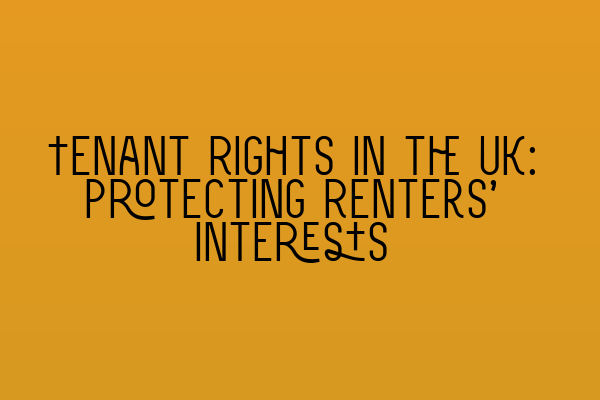Tenant Rights in the UK: Protecting Renters’ Interests
As an experienced solicitor at SQE Property Law & Land Law, I understand the importance of protecting the rights and interests of tenants in the UK. Renting a property is a significant financial commitment, and it is crucial for renters to be aware of their rights to ensure a fair and secure tenancy.
In this blog post, I will discuss important tenant rights in the UK and how renters can ensure their interests are protected. Whether you are a new tenant looking for your first rental property or an experienced renter seeking to understand your rights better, this guide will provide you with valuable information and resources.
1. Right to a Written Tenancy Agreement
One of the fundamental rights of a tenant in the UK is the right to a written tenancy agreement. This agreement is a legally binding contract between the landlord and the tenant, outlining the terms and conditions of the tenancy. It is essential to carefully read and understand this document before signing, as it will have a significant impact on your rights and obligations as a tenant.
If you have any concerns or questions about the terms of your tenancy agreement, it is advisable to seek legal advice. A solicitor specializing in property law can review the contract, provide guidance, and help negotiate any necessary changes to protect your interests.
2. Security of Tenure
Security of tenure refers to the legal protection against eviction without a reasonable cause. Under the UK law, most tenants have the right to remain in their rented property for an extended period, even after the initial fixed-term tenancy agreement has ended. This protection is provided by the Assured Shorthold Tenancy (AST).
However, it is important to note that certain conditions must be met for security of tenure to apply. These conditions include paying rent on time, not breaching any terms of the tenancy agreement, and allowing the landlord reasonable access for repairs and maintenance. If the tenant fails to meet these conditions, the landlord may be able to start eviction proceedings.
3. Rent Increases
Rent increases during a tenancy are a common concern for tenants. In the UK, landlords have the right to increase the rent, but certain rules and procedures must be followed. To protect tenants’ interests, the landlord must provide a written notice of the rent increase, usually with at least one month’s notice. The notice must also comply with the terms stated in the tenancy agreement.
If you believe that your landlord’s rent increase is unfair or does not follow the legal requirements, it is important to seek legal advice. A solicitor specializing in property law can guide you on how to challenge the rent increase and ensure that your rights as a tenant are upheld.
4. Repairs and Maintenance
Another crucial aspect of tenant rights in the UK is the right to a safe and habitable living environment. Landlords have a legal obligation to maintain the property in a good state of repair and provide necessary repairs promptly. This includes ensuring the property is free from hazards, keeping the plumbing and electrical systems in working order, and maintaining essential amenities.
If the landlord fails to carry out necessary repairs or refuses to address maintenance issues, tenants have the right to take legal action. It is advisable to document all communication with the landlord regarding repairs, including written notices and photographs. Seeking legal advice can help tenants understand their options and ensure their rights are protected.
5. Deposits and Tenancy Deposit Protection
In the UK, landlords are required to protect tenants’ deposits in a government-approved tenancy deposit protection scheme. This scheme ensures that tenants’ deposits are safeguarded and can be returned at the end of the tenancy, provided the tenant has met their obligations under the tenancy agreement.
If a landlord fails to protect the deposit or does not comply with the prescribed procedures, tenants may be entitled to compensation and the return of their deposit. Seeking legal advice can help tenants understand their rights regarding tenancy deposits and take appropriate action if necessary.
Protecting Tenant Rights: SQE Property Law & Land Law Can Help
At SQE Property Law & Land Law, we are committed to helping tenants protect their rights and interests. Our team of experienced solicitors specializes in property law and has extensive knowledge of tenancy laws and regulations in the UK.
Whether you need assistance reviewing a tenancy agreement, challenging a rent increase, or seeking compensation for deposit issues, our solicitors can provide you with expert advice and representation. We understand the importance of ensuring fair and secure tenancies for renters, and we are dedicated to fighting for your rights.
For more information about our services or to book a consultation, please visit our website. You can also check out our related articles on SQE 1 Practice Exam Questions, SQE 1 Practice Mocks FLK1 FLK2, SQE 2 Preparation Courses, SQE 1 Preparation Courses, and SRA SQE Exam Dates.
Remember, knowing your rights as a tenant is crucial for a smooth and stress-free renting experience. Don’t hesitate to seek legal advice to protect your interests and ensure a fair and secure tenancy.
